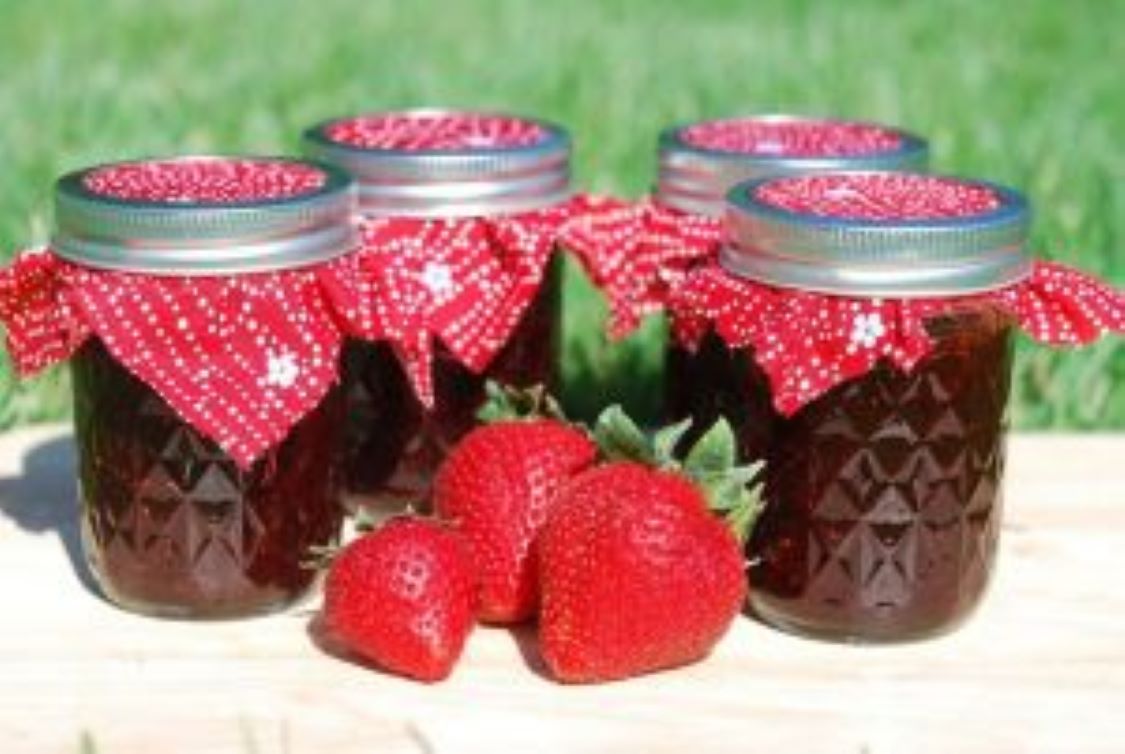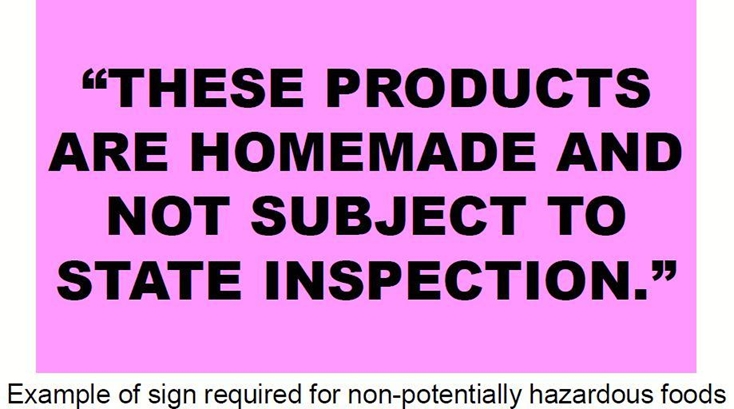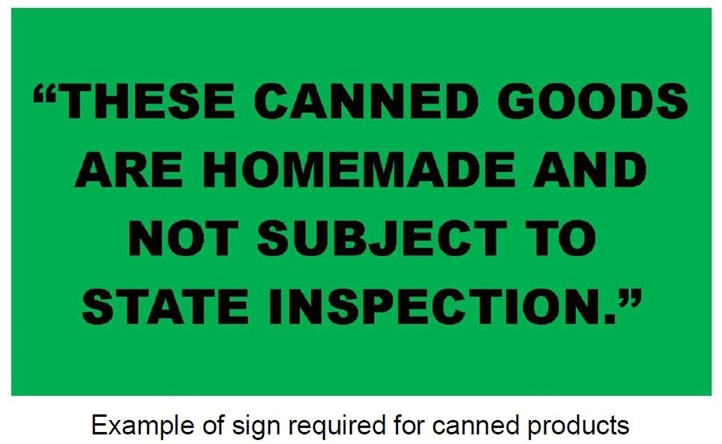How Do You Find Out How Many People Are Registered At My House In Minnesota
![]()
Cottage Food Constabulary Guidance

The Cottage Food Law allows for individuals to make and sell certain non-potentially chancy nutrient and canned goods in Minnesota without a license. This law, the Cottage Nutrient Exemption, went into consequence in 2015 and includes details on the prior training and registration, types of nutrient immune, food labeling, types of sales locations, and amount of sales immune by a cottage food producer. Boosted legislative changes were passed in 2021, with effective dates of August ane, 2021 and January 1, 2022. Key changes included:
- Increasing the sales cap per registered private to $78,000.
- Increasing the Tier 1 sales cap (exempt from registration fee) to $seven,665.
- Adding pet treats for dogs and cats but equally an allowed cottage nutrient (MS 25.391).
- Allowing individuals to organize their cottage food business organisation as a business entity recognized by state constabulary.
- Requiring the characterization to include the name and registration number OR the name and address; and the statement, "These products are bootleg and non subject to state inspection".
Hither are answers to some frequently asked questions well-nigh the Cottage Nutrient Law.
Registration – Before you Register
All individuals who desire to make and sell foods described in the Cottage Nutrient Police force need to register with the Minnesota Department of Agriculture (MDA) before selling food.
If you're not regularly engaged in selling food, every bit defined in Minnesota Statute, then you don't need to register. All the same, if you regularly sell cottage nutrient at these types of venues or directly from your home, so you practise need to register.
The toll of registration is determined by annual sales within the agenda year, which begins on Jan 1 and ends on Dec 31. The registration fee is $50 if y'all sell more than $seven,665 in a twelvemonth. If you sell $7,665 or less in a year, there is no fee.
Encounter answer in Question 19 below. Note that the maximum corporeality of annual sales allowed nether the Cottage Food Law is $78,000 for an individual.
Your registration expires on December 31 of the year it was issued. If you want to continue to sell food under the Cottage Food Police, y'all volition need to re-annals for each year that you are selling nutrient.
Yes, you lot must complete preparation and pass an exam prior to registering and selling cottage food. For more information on training, see the Training section below.
You must comply with the ordinance and cannot produce and sell nutrient from your dwelling. Depending on the ordinance, it may be possible to make and sell food every bit a registered cottage food producer at an acceptable location such equally a commercial kitchen. If you lot have a question about this, check with your city or county.
An individual who qualifies for a cottage food exemption may organize the private's cottage food business as a business entity recognized by Minnesota state law. More information on legal Minnesota business entity structures can be establish on the Minnesota Secretary of State Part website.
Yep. You can simply annals and sell food under the Cottage Food Law if you lot are selling a type of food allowed nether law, have taken the proper grooming, are properly labeling the nutrient, are selling and delivering the food directly to consumers in places allowed by the constabulary, are non exceeding the $78,000 annual sales cap, and your local jurisdiction (city or county) does not have an ordinance restricting you lot to make and sell nutrient from your home. Each of these topics are farther explained in the sections below.
Yous tin apply for a nutrient license. Nutrient licenses do not have restrictions on the amount of annual sales, allow for a wide variety of foods to be sold, and allow for several types of sales. To discover out more, become to the MDA Food Licensing Wizard.
Registration - How to Annals
You volition need to provide your total name, address, and contact information. You will also need to provide your social security number or a Minnesota Tax ID number. You may also include your cottage food concern proper name (if yous are operating as a DBA or other legal Minnesota business entity). Finally, y'all will demand to sign and date the registration form attesting that you lot have taken the training and understand and will follow the Cottage Food Law.
Keep your registration with y'all when selling food. An inspector or market place managing director may enquire to come across information technology and you need to show your registration when asked. If the registration cannot exist verified, you may be asked to stop selling nutrient.
All current cottage food registrations can be institute on our MDA license lookup page. Fill in the desired search terms (registration number, name, urban center, or county) and select COTTAGE Nutrient PRODUCER REGISTRATION in the License Type list.
All cottage nutrient producers with a current registration will receive a re-registration reminder in the mail at the end of December. Y'all accept 2 options for re-registration: (1) you lot tin complete a newspaper registration form or (2) you lot can re-register online following the instructions and using the Pin provided in the re-registration notice. The online re-registration portal also accepts payment of any registration fees that are owed. Annotation that there is a $ii.50 processing fee for the $50 registration fee paid online for Tier 2 producers.
If your name or your address has changed, you will need to complete a new registration form to re-register and provide the updated information. At this time, yous cannot apply the online portal to re-register if you lot have moved or changed your name.
Corporeality of Sales
Nutrient sales are based on the anticipated amount of cottage food sales during the calendar year for which y'all are registering. This is the corporeality of gross annual receipts, not just profits, meaning the total corporeality for all sales as measured by the sales price.
You lot are limited to $78,000 dollars in food sales in whatsoever calendar year. If you lot sell more than $78,000, you demand a nutrient license and meet applicable laws for making and selling food nether that license. For more information virtually food licenses, see the MDA nutrient licenses page or go to the MDA Nutrient Licensing Wizard.
Training
Yes, you must complete the grooming appropriate for the amount of sales expected during the agenda year before you lot register. You volition be asked to provide the about recent appointment that you completed the training when y'all register.
There are ii types of preparation, one for each sales category:
- Tier 1 – For annual food sales upward to $vii,665, you must complete a free online preparation form and exam. This form tin can be plant here: Cottage Food Producer Tier ane Training.
- Tier 2 – For annual food sales betwixt $7,666 and $78,000, you must complete a safe food handling training course that is approved past the Commissioner. Refer to the University of Minnesota Extension Nutrient Safety Program for more data. This Tier 2 training is currently offered as an in-person course or as an online course and in that location are training fees for both courses.
No, you must take training that is specific to the Cottage Food Law. The required training covers specific considerations about preparing food safely in a home kitchen and covers the Cottage Food Law requirements.
There are 2 training requirements, ane for each sales category:
- Tier one – For annual food sales up to $7,665, you must complete a free online training course and exam every yr.
- Tier 2 – For annual food sales between $7,666 and $78,000, you will need to re-take preparation every three years or if you switch from Tier 1 to Tier ii, meaning you go from selling $seven,665 or less to selling $7,666-$78,000. Yous will be asked to provide the most recent engagement that you completed the training when you register.
Types of Food Allowed
Yous can only sell non-potentially hazardous foods and dwelling-candy and abode-canned pickles, vegetables, or fruit with a pH of 4.vi or below. Foods that are non-potentially chancy do non support the rapid growth of microorganisms that tin can brand people sick. Not-potentially hazardous foods have a pH of 4.6 or below, meaning they are acidic, or accept a water activity of 0.85 or less, pregnant they are relatively dry out or have a high carbohydrate or common salt content that binds up the h2o making it hard for bacteria to grow.
Many university websites provide recipes that have been laboratory tested and shown to be considered not-potentially hazardous. If y'all are unsure if the nutrient you want to sell meets the definition of a not-potentially hazardous food, at that place are laboratories that can examination your food for pH and water activity and tin can be establish through a web search for "food testing laboratories in Minnesota".
Treats must exist non-potentially hazardous, meaning they do not support the rapid growth of leaner that would make people or pets ill when held outside of refrigerated temperatures. Only broiled or dehydrated treats can exist made nether the cottage food exemption. Just treats for dogs or cats can be fabricated and sold nether this exemption, and they must exist rubber for the intended species. Some ingredients (for case, onions) may exist toxic to cats or dogs and should non be added to pet treats.
Labeling, Signage, and Packaging
Yep, you must label the food with:
- Your full proper name as the private cottage nutrient registrant OR your cottage food business name submitted on your cottage nutrient awarding (if operating every bit a DBA or other legal Minnesota business organisation entity),
- Your registration number OR address submitted on the cottage food application,
- The date that the nutrient was made,
- The statement "these products are homemade and not subject to state inspection", and
- A list of ingredients independent in the product, including any allergens. The allergens of concern are milk, eggs, wheat, soy, peanuts, tree nuts, fish, and shellfish. More information on labeling is provided in the cottage food training course (run into Training section).
You must display a sign at the point of sale that states: "These foods are homemade and not bailiwick to land inspection." Examples of signs can be constitute at the bottom of this page and in the cottage food training (see Training section). If you are conducting internet sales, this same statement must exist posted on your website.
Cottage food must be produced, pre-packaged, and labeled in the residence. Cottage foods cannot exist produced onsite at a community event or farmers' market. If the business wishes to produce foods onsite, the business organisation may obtain a license from the state or local health department.
Sales Locations
A registered cottage food producer can sell the food they brand from: (1) their abode, (ii) a farmers market (EXT), and (3) a community event. Examples of community events include public gatherings sponsored or hosted by a town, county, city, or municipality (for example, a county fair); or by a religious, charitable, or educational system where the food is sold (for example, a school, fire, police force, or parent/instructor association). A community event must exist open up to the public and not intended for profit.
The cottage food producer who prepared the nutrient production must exist physically present to acquit sales at the berth or stand.
Nutrient that is home-processed and habitation-canned, like pickles and salsa, cannot be sold outside of the Land of Minnesota. For sales of other homemade food outside of the country (like broiled goods), please review those states' laws to ensure the auction of bootleg food is allowed.
If cottage nutrient is ordered by a customer for delivery, the cottage food producer must personally deliver the nutrient to the customer's dwelling or run across the client in person at another agreed-upon location within Minnesota to evangelize the food straight to the customer. This ways nutrient cannot be shipped or delivered through the mail service or a 3rd-party shipping service.
Cottage nutrient producers tin receive orders over the cyberspace. The client can then collect the nutrient they ordered by going to the producer's home, by picking up the food at a booth or stand up at a farmers' market or community upshot, or past the producer delivering the food to the customer.
Aye. Food fabricated by a registered cottage food producer can exist provided through donation to a community event with the purpose of fundraising for an individual or for an educational, charitable, or religious system. The cottage food producer does not need to be present for the fundraising event.
No. All food must be delivered directly from the producer to the stop consumer, non through an intermediary.
Yes. Customers must come to your place of residence to pick up products or y'all, as the producer, must evangelize them directly to customers. You lot may non get out products for client pick upward at a location other than their or your residence.
Aye. The cottage food producer or their employee must exist physically nowadays during product sale or delivery.
Inspection and Compliance with the Law
Local agencies often deport inspections at venues like farmers' markets and community events to verify registration and that nutrient is being sold in a way consistent with Minnesota laws. In add-on, if nutrient sold by a cottage food producer is suspected or confirmed to have caused illness or injury, the MDA volition carry an investigation which may include an inspection of the location where the nutrient was produced. Under Minnesota police, the MDA has the authority to enter at reasonable times whatever establishment where food is manufactured, processed, packed, or held. Inspection and investigation activities would be express to areas of the location where food is manufactured, processed, packed, or held.
The MDA investigates complaints to ensure people selling cottage food are complying with the police force, including all the topics covered in this guidance certificate: registration, training, sales amounts, sales locations, food types, and labeling and placarding. Actions depend on the severity of the violation and may include inspection, written notice, registration revocation, penalties, or prosecution.
Cottage food can be produced in a dwelling kitchen or in a commercial kitchen equally long as you follow local ordinances. Commercial kitchens are licensed by the Minnesota Department of Health, the MDA, or one of their delegated agencies.
*Note* As is always the case, practise not make, sell, or store cottage food in your domicile if anyone in the household is sick. Follow adept food safety practices of proper hand hygiene, preventing bare hand contact with set up-to-consume foods, and regular cleaning and sanitizing of equipment and surfaces.
Examples of Signs to be Displayed
For more than data on these signs, see the Labeling and Displaying a Sign department above.




© Copyright 2022 Minnesota Department of Agriculture
How Do You Find Out How Many People Are Registered At My House In Minnesota,
Source: https://www.mda.state.mn.us/food-feed/cottage-food-law-guidance
Posted by: kerstendees1956.blogspot.com


0 Response to "How Do You Find Out How Many People Are Registered At My House In Minnesota"
Post a Comment